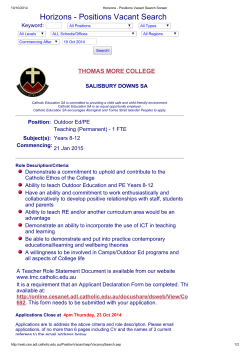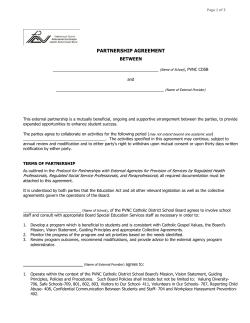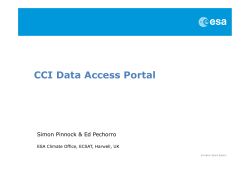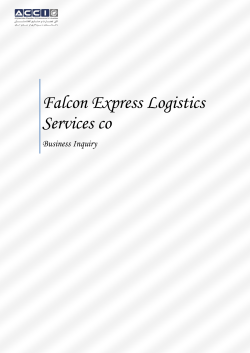
Less risk. More support. www.ccinsurance.org.au
www.ccinsurance.org.au no. 72 2014 Less risk. More support. We launch www.risksupport.org.au our new online space dedicated to helping clients better identify and manage risk. Viewpoint I am pleased to report Catholic Church Insurance achieved another strong result for the 2013/14 financial year. Despite obvious economic and geopolitical challenges, global sharemarkets performed well, delivering double-digit investment returns for the second consecutive year. The local market also experienced solid gains. Peter Rush Chief Executive Officer Our strong investment result enabled us to recommend the payment of dividends of 40 cents per share and grants to both the Australian Catholic Bishops Conference and Catholic Religious Australia. It has also allowed for the distribution of surplus to Catholic entities. In addition, the Board and management accepted independent actuarial advice to strengthen reserves to meet potential future claims. Despite the increase in these reserves, we have been able to maintain a capital ratio which is almost double that required by the Australian Prudential Regulation Authority (APRA). As an APRA regulated company, we are subject to regular reviews as part of the normal supervisory process. Our most recent review was completed late in the financial year and the results were very pleasing overall. While the company remains strong and secure we have implemented a number of initiatives to enhance our risk management and governance practices as a result of APRA’s findings. Improving the way we engage with our clients is of particular interest to us at CCI and we’re taking advantage of available technology to reach our goals. We’ve recently developed of a series of online tools, including one for workers’ compensation which will enable our clients to access key information on their workers’ compensation matters. This technology is currently being trialled with a small group of clients before being made available more broadly. Targeted risk services have been integral to our client offering for at least 30 years, and more generally since the very beginning of the company. To foster this work, we have launched a new website www.risksupport.org.au which Improving the way we engage with our clients is of particular interest to us at CCI and we’re taking advantage of available technology to reach our goals. This information is provided to Securitas readers for information purposes only. It should not be used or considered as a comprehensive coverage of the topics discussed, or relied on as a substitute for detailed professional advice or as a basis for formulating insurance and/or investment decisions. As this information is of a general nature only, readers should consider obtaining independent professional (including financial) advice to ensure that individual circumstances are properly considered. For information about the products and services available from Catholic Church Insurance Limited please call us on 1300 655 001, or for further information about investment options from CCI Asset Management Limited please call 1300 655 220. CONTENTS takes this service a step further, offering clients access to the support and assistance needed to minimise and then manage the risks they face in their day-to-day operations. To read more turn to page 8 of this edition of Securitas. A number of new senior appointments have been made over the last few months. Following the retirement of long-serving State Managers Tony Cassar, Gary Esler and Bob Fragomeni we have, for the first time I believe in our history, appointed a new state manager in every state and territory, with the exception of South Australia, over a period of less than 18 months. Developing the potential of our own people is fundamental to our philosophy at CCI. The promotion of Sylvia Wong, who has worked for us for 25 years, to State Manager for Victoria and Tasmania, and new Western Australian State Manager, Nicole Dennis, whose understanding of insurance in the country’s west has been an enormous asset over the last two years, is testament to our commitment to foster and celebrate the skills and strengths of our team. The injection of new skills is extremely valuable to the company and our clients, encouraging new ways of thinking and broadening our leadership abilities. Both Hugh Easton and Susan Yates, who take over the management of our business in Queensland and New South Wales/ACT respectively, come to us with a wealth of experience and expertise to our mutual benefit. I would like to take this opportunity to welcome each of our new managers to the company and their new roles and I look forward to introducing them to you more fully in the next issue of Securitas. Finally, I would like to thank you, our clients and partners for your ongoing commitment and loyalty to CCI and for the contribution which you have made to another successful year for this business. I and my colleagues look forward to continuing to serve you and the Catholic community. 4News 6 Ongoing Office for Youth The Australian bishops show how highly they prioritise the hopes and needs of young people. 7 Into the highways and byways The Missionary Sisters of Service commemorate their 70th year of service. 8 Less risk. More support. Introducing risksupport.org.au an online space dedicated to helping clients better identify and manage risk. 12 Sowing seeds Mercy Education’s popular Seeds of Justice program empowers young people to act on issues of social justice. 14Acceptance is crucial for better mental health Peter Rush Chief Executive Officer Youth Off the Streets on the power of self and community acceptance. 15 Ask an expert What is a managed fund? 16 Building a pathway for Indigenous teachers A new national program will help fund mentoring programs for Indigenous teachers and students. Securitas is a quarterly magazine produced by Catholic Church Insurance Limited ABN 76 000 005 210 AFSL No. 235415 for its Church clients. All correspondence should be directed to: The Editor Securitas, Catholic Church Insurance Limited, Reply Paid 180 Melbourne VIC 8060 securitas@ccinsurance.org.au 3 News Bob Fragomeni retires In July, Bob Fragomeni announced his retirement after 30 years as State Manager for Western Australia and 35 with the company. Bob joined CCI in 1979 as a chief clerk in Western Australia, spending just two years in the 1980s in the New South Wales Office as Assistant Manager before returning to his home state to take up the State Manager’s role. “My time at CCI has been a terrific journey,” says Bob. “I am essentially a person who likes to serve. I love doing what I do; using my skills and training to assist the Church. It’s what has motivated me and given me purpose.” “My goal has always been to try and improve what we were doing from one year to the next,” he adds. “I’ve embraced the changes within the organisation over the years and I can see they have brought enormous benefits for clients, especially in the area of technology.” Did you know? We want to make your experience with CCI personal insurance better. So, we’ve relaunched our personal insurance website to include: cleaner, clearer design and layout additional product information; plus stories about our community program initiatives. Visit our new and improved website now. www.catholicinsurance.org.au 4 The relationships he’s built with staff and clients hold some of the most powerful memories Bob says he will take with him into his retirement. “Building and maintaining relationships is in my view the most important element of a state manager or any management role. I’ve always felt welcomed by my clients and respected for what I do and who I am.” Bob will leave the company in late November and retire in 2015. Management and staff would like to take the opportunity to thank Bob for his contribution to the company and to wish him well in his retirement. Nominations open for new Australian Catholic awards A new initiative of The Catholic Leader will recognise Catholics who’ve displayed exemplary leadership and dedication in the community. The Community Leader Awards will acknowledge those who, inspired by their Catholic faith, have made a significant difference to Australian culture, awarding individuals in the categories of Professional Leader of the Year, Young Leader of the Year, School Leader of the Year, Volunteer of the Year and Community Leader of the Year. Catholics living in Australia are invited to nominate themselves or others. Brisbane Archbishop Mark Coleridge will present one of the five awards at the official ceremony in November. Nominations close on 31 October. Visit www.catholicleader.com.au/awards2014 for details. Outreach program wins CHA award Catholic Health Australia’s 2014 service awards were announced at the CHA National Conference in August honouring the contribution of individuals, groups and services the industry. Five categories of service were awarded. Amongst the winners was, Ermha Origins, a program jointly managed, funded and supported by St John of God Health Care’s Pinelodge Clinic and psychiatric rehabilitation and support service Ermha and supporting vulnerable recent arrivals to Australia who are living with a mental illness. “By becoming a trusted part of the very diverse Dandenong community, Origins has been able to work with ethnic communities to identify people who are in need of care – many of whom have experienced trauma either in their home country, on their way to Australia or in detention,” said Catholic Health Australia Stewardship Board chair Rowena McNally. The program has supported more than 400 people from 20 countries to date. Helping clients gain strength and independence, re-establish ties with family and community and find new opportunities for work or study. CCI would like to congratulate all the winners and nominees. Alys Boase from Ermha and James McDonald, Director of Mission St John of God Pinelodge Clinic, accepting the award. Footy tipping winners It has been another big year of football and we hope this has been a great AFL and NRL season for you. AFL winners NRL winners Round 9: Round 9: Joe Williams Russ Johnson Round 10: Domenic Muscari Round 10: Pauline Higgins Round 11: Round 11: Jackie Hanson Gaye Mulligan Round 12: Sr Gabrielle Morgan Round 12: Amanda Milczarek Round 13: Brendan Hogan Round 13: Angelo Savino Round 14: Peter Richardson Round 14: Julian Cartledge Round 15: Jan Rees Round 15: Dona Volcveska Congratulations to all of our winners. Round 16: Lee Pope Round 16: William Vassiliou Round 17: Elton West Round 17: Brendan Hogan Round 18: Brent Russell Round 18: Carolyn Ryan Join the CCI Footy Tipping competition again in 2015 to see if your tips can make you a winner. Round 19: Genevieve Devenish Round 19: Fiona Bruzzi Round 20: Michael Chambers Round 20: Michael Cossey Round 21: Judy Nettleton Round 21: Phillip Vassiliou Round 22: Antonietta Faccioni Round 22: Julian Cartledge Round 23: Luke Truman Round 23: Fiona Bruzzi For more information, visit www.ccinsurance.org.au/footy Winner of lowest combined margin for rounds 18, 19 and 20 was Margaret Davies. Round 24: Elizabeth Powell Round 25: Peter Richardson Round 26: Kevin Arrow Congratulations to the overall winners for this AFL season: Congratulations to the overall winners for this NRL season: 1st Prize: 1st Prize: Louise O’Connor Debbie Preuss 2nd Prize: Mark O’Brien 2nd Prize: Gaye Mulligan 3rd Prize: Victor Calleja 3rd Prize: Mick Tobin 5 Ongoing Office for Youth In May, the Australian Catholic Bishops Conference (ACBC) announced it would establish an ongoing national Office for Youth. Bishop Anthony Fisher OP, the Bishops Delegate for Youth, shared his joy at the announcement. “This is another sign of how highly the Australian bishops prioritise young people and want to respond to their hopes and needs,” he said. The Office for Youth will be staffed by new Director Malcolm Hart, who has worked as Senior Youth Ministry Projects Officer for the Bishops Commission for Pastoral Life (BCPL) for the past five years, and Projects Manager Gabrielle Sinclair, who has also worked for the BCPL for several years. During his time with the BCPL, Malcolm led the implementation of a number of initiatives and resources including Australia’s participation in World Youth Day 2011 and 2013 and the hugely successful Australian Catholic Youth Festival. “I am deeply passionate about sharing the message of Christ with young people and empowering them to go forward in their faith,” says Malcolm. “The national office recognises the past work we have achieved under the auspices of the BCPL and shows a strong commitment to the future.” “It is both intimidating and exciting to be the first director of an office,” he says. “But I do love working at this level and I love the role. It’s been a lot of hard work getting everything established but it’s been a very rewarding experience.” Gabrielle Sinclair, ACBC Office for Youth Projects Manager; Australian Catholic Bishops Delegate for Youth, Bishop Anthony Fisher OP; Malcolm Hart, Director ACBC Office for Youth. The first event on the new office’s calendar was the Australian Catholic Youth Ministry Convention held in Adelaide in early October. The most comprehensive gathering of people engaged in youth ministry in the country, the convention is one of the major events the office will run on a three-yearly cycle going forward. The next events on the schedule are the Australian Catholic Youth Festival to be held in Adelaide in 2015 and Australia’s participation in World Youth Day 2016 in Poland. “Since WYD 2008 youth ministry has grown substantially in this country. Our new status as an office gives us more credibility amongst Church organisations and in the secular world. This will enable us to carry our initiatives forward and really push the needs of young people in Australia both here and internationally.“ Like to know more? Visit www.youthministry.catholic.org.au This is another sign of how highly the Australian bishops prioritise young people and want to respond to their hopes and needs. Bishop Anthony Fisher OP 6 “In reality it is basically business as normal for us, just with a new identity,” says Malcolm. Into the highways and byways Founded in 1944 to minister to those on the margins, the Missionary Sisters of Service celebrate their 70th anniversary this year. The story of the Missionary Sisters of Service began in 1933 on remote Bruny Island off the coast of Tasmania. Visiting priest, Father John Corcoran Wallis, was asked by a mother, “Why can’t we have sisters come to us? Doesn’t anyone care about us people in the bush?” A vision formed in the young priest’s mind, of women going into rural and outback areas, seeking out people beyond the reach of care so readily available to others. Women who would visit people in their homes, support, encourage, counsel, teach and empower them to nourish their families and communities. On 8 July 1944, the first four of these women came together in Tasmania and became the Missionary Sisters of Service. In the 70 years since, their reach has spread throughout Tasmania, South Australia, New South Wales, Queensland, Victoria and Singapore. “John Wallis was ahead of his time,” says Congregational Leader, Sister Stancea Vichie. “People said to him, you can’t have women doing this work, it’s too dangerous. But he really dug his heels in.” There were no convents for the Missionary Sisters, who lived amongst the people in little rural and isolated communities, staying in their homes, the back of a Church, a hotel, wherever they could find accommodation. In Tasmania during the late 1940s and 1950s the sisters made use of a caravan as they travelled from place to place – a little Church and home on wheels – and became affectionately know by some as the ‘caravan sisters’. “From the beginning, our spirituality was nourished by the scriptures The rosary caravan was used by the Missionary Sisters during the late 1940s and 1950s. and liturgy,” says Sister Stancea. “Communion of mind and heart with one another was valued over the need to all live together to create community”. Over the years, with better technology and transport available for rural families, the sisters’ moved into urban areas as well. Working with those facing cultural or social isolation and involving themselves in spiritual and personal development and seeking justice around issues such as refugees, human trafficking and ecology. In 2010, the sisters set up the John Wallis Foundation to carry on their vision and mission now and into the future. In the spirit of the Missionary Sisters of Service, the Foundation reaches out to people on the margins in various parts of the country. Bruny Island remains a special place for the sisters and will be the site of a pilgrimage on 23 November 2014. The sisters encourage anyone with a connection to the congregation to visit the site that challenged John Wallis to think beyond and challenge what was possible. Like to know more? Visit www.missionarysisters.org.au or www.johnwallisfoundation.org.au The Missionary Sisters of Service Leadership Team, left to right, Bernadette Wallis, Stancea Vichie and Corrie van den Bosch. 7 Less risk. More support. We’ve launched our new risksupport website. An online space dedicated to helping our clients better identify and manage the risks in their organisation, whenever they need it and wherever they are. For over 100 years, CCI has acted in the best interests of our clients by putting people before profits. Today, we continue to bring peace of mind to the Church community by being there when we’re needed most and risksupport is part of that commitment. Our risksupport team is dedicated to helping clients minimise risk, prevent disruptions to services, understand their legal obligations, deal with incidents should they occur and protect the health and safety of their people. They’ve developed a range of resources and services designed specifically for Catholic organisations and now, with the launch of www.risksupport.org.au, our clients can find them all online. Access Fact Sheets, Checklists, Templates, Guides and Hazards. Learn More about our services including Learning Manager, Risk Management Health Check, Keeping Your Parish Safe Forums, Risk Control Reviews and workshops. Find Information specific to your sector or your topic of interest with our specialised search function and simple navigation. Discover The latest in risk news from client interviews to legislation changes and from education to alerts. www.risksupport.org.au 8 Topics News Our specialised Search function makes information easy to find and can be filtered by the risk topic, resource type and sector to help you find the information you’re looking for. Our News section will keep you up-to-date with helpful risk management advice for Catholic organisations. Resources Services You will find all risksupport Fact Sheets, Checklists, Templates, Guides and Hazard information sheets in our Resources section. Our Services section contains all our risksupport Services including Learning Manager, Workshops, Forums, Risk Management Health Checks and Survey Manager. www.risksupport.org.au 9 Less risk. More support. continued risksupport team Meet our risksupport team, a group of industry professionals with an enviable set of skills and a passion for helping clients manage their risks. Mark joined CCI in November 2008. Mark manages the risksupport team and works on the development and provision of effective and practical risk management programs, resources and services. “We are a team dedicated to educating clients and helping them minimise the many risks Catholic organisations face every day,” says Mark. Mark Wilson National Risk Services Manager “The role is as interesting and varied as the diverse range of customers and risks we insure, and I work with a team of innovative and proactive specialists.” Susan joined CCI in May 2014. She says she’d been on the look-out for a role with CCI for some time. “CCI has a reputation as a good employer with a strong focus on client service,” says Susan. “It’s an organisation with sound values and that’s important to me.” As State Manager, Sue has a dual role to look after both the insurance needs and risk management needs of CCI clients in NSW & ACT. Her focus is ensuring clients are aware of and take advantage of all the services CCI has to offer. Married with two teenage sons, life outside of work is all about family. Susan enjoys spending time with family and friends, working on her home and garden as well as reading and travelling. “I enjoy interacting with our varied and friendly client base and having the freedom to be able to develop risk support services that benefit our clients,” says Graham. Risk Consultant 10 Mark and his wife Cate and two sons, live in Geelong. He likes to spend time with family and friends or indulging in his hobbies of running, travelling, reading and the occasional frustrating round of golf. “Our services are never static,” she says. “We develop our offering in response to clients’ needs and work in partnership with them to support the Church’s risk management capability.” Graham worked as a risk consultant in the government sector before coming to CCI four years ago. As one of our Risk Consultants, Graham takes care of a variety of Church clients, from dioceses and archdioceses, to education offices and religious orders. Graham Porter “Our range of risksupport services are designed specifically for our client base, however we are regularly updating and expanding our resources and services to ensure they evolve with technology, emerging risks and the law,” he adds. Susan Yates State Manager New South Wales and Australian Capital Territory “CCI is owned by the Church, so everything we provide through our risksupport function is not only for the benefit of our clients but for the Catholic Church in Australia as a whole.” Graham is married and just celebrated ten years since moving to Australia from the UK. He loves listening to music and seeing live music. Graham’s wife is a food blogger, so their social life regularly combines their two loves – music and food. Laura Hammett Risk Consultant Laura worked in the area of public liability risk for an international broking firm before joining CCI in mid 2014. Now, as one of our Risk Consultants she’s delivering risk services to clients in Western Australia and Victoria. She’s also involved in the development of new publications and services. from training, risk assessments or the development of business continuity plans.” Laura says she’s enjoying the diversity of the role and assisting clients across a broad range of sectors. Laura is married and she and her husband have a much loved Moodle called Henry. The pair are currently learning to speak French in the hope of being able to converse with the locals on their next visit to France. “The services we deliver depend on their individual needs and requirements,” says Laura. “This might incorporate anything Narelle joined CCI and the risksupport team last year. With her strong background in both external and internal risk management she’s well placed to oversee the day-to-day operation of the team. Unlike the Risk Consultants who spend much of their time on the road visiting clients, Narelle spends her working days at CCI’s head office in Melbourne, maintaining and developing relationships with the team’s key internal and external stakeholders. “Helping clients understand and identify their particular risks and then assisting them with the development and implementation of cost-effective solutions is very satisfying.” “I enjoy the variety of my role,” says Narelle. “And CCI is a great company to work for. They don’t just say they encourage work life balance – they actually do!” Narelle is married and she and husband Adrian have two furry kids - Sake their four-year-old Samoyed and Matisse their 12-year-old Burmese. Narelle Salvo Risk Services Coordinator Chris has been with CCI for ten years. Since joining the company Chris has held a variety of roles in a number of different departments including the personal lines, claims and underwriting areas. He became a member of the risksupport team in 2012. Chris Hall Chris’s broad experience and company knowledge enables him to deliver exceptional service to his clients. Much of his time is spent meeting with clients, providing risk advice and delivering risk services and products. “My role has taken me to some surprising places,” says Chris. “Whether our clients are in Far North Queensland, the remote wilderness of Western Australia or around the corner in downtown Melbourne, they all have a story to tell and need our assistance in some way.” Married with two daughters, Chris is, by his own admission, obsessed with sport. He plays cricket, coaches at his local football club and is a mad Collingwood supporter. Risk Consultant Peter is based in our Sydney office. Prior to joining CCI four years ago, Peter worked in various WHS and Return to Work roles for archdiocesan and state government agencies. Peter loves the active nature of his role at CCI. Much of his time is spent visiting the 11 dioceses and archdioceses he services across New South Wales and the Australian Capital Territory delivering WHS audits and training. “CCI has a really practical, hands-on approach to helping clients manage their risks,” says Peter. “I enjoy meeting with my clients and working with them to determine the best way to solve their problems.” Peter is married with primary-school aged twins. He likes to keep fit and is a Formula 1 and NRL fan. He was an NRL referee, but has more fun watching the games as a fan than as an official. He and the family enjoy adventures having recently camped at Western Plains Zoo and walked the Mount Kosciusko Summit. Peter Kirby Work Health and Safety Consultant 11 Sowing seeds The Seeds of Justice program offers students and teachers the opportunity to deepen their awareness of social justice and meet like-minded people from other schools. Over the last decade, Seeds of Justice, an initiative of Mercy Education, has coordinated two student camps and one staff conference each year for metropolitan schools in Victoria. In 2013 the scope of the project began to grow, stretching to encompass schools from regional Victoria, Western Australia and South Australia. “We like to think we plant a seed of justice in the young adults who come along,” says Eugene Lynch, Executive Officer at Mercy Education and member of the Seeds of Justice Committee. “It may not change them immediately, but as they move into adulthood we hope that they’ll act upon that inspiration.” Seeds of Justice Committee Chair and teacher at Sacred Heart College Kyneton, Sam Weir agrees. “Talking about justice is at the very core of what we do in Catholic education and in Mercy schools,” he says. “Many of the students who come along are passionate about social justice. When they come together with other like-minded young people they gain the confidence and courage to act.” “That’s the joy of being involved in this project,” says Sam. “It’s quite enlivening and very humbling to mix with dynamic young people who are looking to be agents of hope and change in their world.” According to Eugene there’s a strong correlation between the students they work with in Seeds of Justice and those who end up as leaders in the schools. Mercy College Coburg teacher, Mairead Kennedy, sits on the Seeds of Justice Committee but her history with the program goes back much further. Above and opposite page: Students from the Seeds of Justice program. 12 Mairead’s mother, Maryann, was justice coordinator at Sacred Heart College in the central Victorian town of Kyneton where Mairead was a student. Maryann first encouraged Mairead to attend a Seeds of Justice camp in Year 9. Mairead admits she was initially more excited about the prospect of a few days off school than what she might gain from the program. “That first camp was absolutely brilliant,” she says. “We had a great time and got to network with students from other schools who were all just bursting with enthusiasm and passion for social justice. I went to the camps twice a year for the next three years and became my school’s social justice captain.” It was the beginning of Mairead’s lifelong passion for social justice. Growing up in Kyenton, a town of less than 7,000 people nestled in the Macedon Ranges about 85 kms from Melbourne, Mairead recalls feeling a bit sheltered from the sorts of experiences young people living in metropolitan areas were having. “The camps provide a valuable opportunity for young people to talk with students from all walks of life about the issues that are prominent in their area. It really opens up your mind to what’s happening in Australia and around the world.” Guest speakers are a feature of the camps, sharing their expert, firsthand experiences working within the field of social justice and then opening up the floor to the students to respond. “What’s so wonderful about teenagers is that they already have a very acute sense of justice,” says Mairead. “What they often lack is a way to move forward and take action. Their ideas might be wonderful and impassioned, but they’re often not that practical.” Mairead says it’s fabulous to see the students open up when a speaker shares an approach that’s worked for them. “They realise the way forward may not be as simple as saying ‘This is wrong, so it must change’. That it’s necessary to approach things in a way that’s going to enact realistic change,” she says. Sitting on the Seeds of Justice Committee and being involved in delivering the program she gained so much from personally has been wonderful experience for Mairead. “Everyone on the committee is so invested in the success of the camps because they know they can change kids’ outlook on life. I know it’s where things really started to kick off for me.” Many of the students who come along are passionate about social justice. When they come together with other like-minded young people they gain the confidence and courage to act. “They say the most powerful learning comes from within and Eugene is always really conscious of making sure the focus is on the student perspective.” “I hope that the young people who come along to the camps enjoy it and leave with a sense of hope,” she says. “Although we spend a lot of time focusing on injustice, we don’t want the students to see things as a hopeless case, or to feel that there are so many issues in the world and there’s nothing they can do.” “There is always going to be inequality in the world, but that doesn’t mean we should stop fighting it.” Like to know more? Visit www.mercy.edu.au CCI is a proud sponsor of the Seeds of Justice program. Sam Weir, Chair, Seeds of Justice Committee 13 Acceptance is crucial for better mental health As Mental Health Month in New South Wales draws to a close we speak to Jeanne Wang, School Psychologist at Chapel School in Sydney’s Merrylands, about the impact acceptance can have on young people. Chapel School is run by nondenominational community organisation Youth Off the Streets. Young people who attend are disengaged from mainstream education. “I would say that in almost all cases, the mental health of the young people in our care has been impacted in some way,” says Jeanne. “Over the years I’ve heard many of our young people say that when they’re out in the community they feel judged, perhaps because of the way they dress or the things that they do,” she says. “And many of our families find it hard to reach out to their communities because they experience a lot of shame around other people’s perceptions of their ability to parent and to cope.” Artwork from Chapel School group therapy program exploring values and goals and learning to cope better with unpleasant thoughts. “Father’s (Youth Off The Streets’ CEO and Founder Father Chris Riley) motto is that there is no such thing as a bad child. It’s just the experiences they go through that make them behave in a particular way. There’s no way of knowing what young people may have gone through, or how they might be struggling to cope. Through my work I’ve learned to judge less and to teach others to do the same.” The approach at Youth Off The Streets can be quite different to other mental health services. The psychologists are able to work more intensely on a daily basis with a smaller group of young people. This makes it possible to build more in-depth relationships and a truly individual treatment plan. Jeanne Wang. 14 “By the time young people reach us they’re often ‘serviced-out’,” says Jeanne. “So we have to try a different approach. We have the flexibility to take them out to get food or coffee, go to the park or just chat to them in the playground. The kids get to know us from a different angle and gain a new perspective of what counselling means or can do.” “You can be the most amazing therapist, but if you don’t have a relationship with your clients your therapy doesn’t mean much,” she says. “The building of relationships is really important to us here at Youth Off The Streets. If you don’t have it you don’t get anywhere.” Like to know more? Visit www.mentalhealth.asn.au, www.1010.org.au or www.youthoffthestreets.com.au Ask an expert What is a managed fund? David Smith, Client Relationship Manager, CCI Asset Management A managed fund is a professionally managed investment scheme. Investors buy into a managed fund by purchasing ‘units’ of equal value and then qualified investment professionals manage the money within the portfolio on behalf of all the investors in the fund. Managed funds are generally designed to meet specific investment goals and objectives. Some may focus on particular asset classes while others may screen for ethical, environmental or other reasons. Why invest in managed funds? Diversification is one of the major benefits of investing in a managed fund. Pooling your money with other investors gives you greater buying power and access assets that might otherwise be out of your reach. Managed funds are great if you don’t have the expertise or the time to invest for yourself. Qualified investment professionals invest your money and they have access to information and research you may not able to access yourself. Managed funds are also fairly flexible, allowing investors to make regular contributions and reinvest earnings. What’s the difference between active and passive management? In an actively managed fund the fund manager is directly responsible for investing your money, using their expertise to read the market and make decisions with an aim to deliver returns in excess of the index. A passively managed fund (often known as an index fund) mimics an index, such as the All Ordinaries index or the S&P/ASX 200, so investment decisions follow the index and the fund aims to generate a similar return to that of the index. Why do unit prices fluctuate? Investors in a managed fund are allocated a number of units, each representing an equal part of the market value of the fund’s portfolio. Units have a dollar value, or ‘unit price’, which is calculated by taking the fund’s total market value, adjusting for any liabilities and dividing this figure by the total number of units held by all investors on that day. Managed funds are great if you don’t have the expertise or the time to invest for yourself. Qualified investment professionals invest your money and they have access to information and research you may not able to access yourself. Unit prices will fluctuate with the rise and fall of the fund’s investments. If the value of the assets owned by the fund goes up, so too will the value of your units, the reverse is true should the value of assets go down. What is a distribution? Realised capital gains and income earned by a fund are passed on to investors in the form of distributions. This generally happens twice a year and investors may choose to reinvest by purchasing additional units or take the money as income. Does CCI Asset Management offer managed funds? Yes. Both CCI Asset Management’s Trusts are recognised by ASIC as a Charitable Investment Scheme, which is a type of managed fund. Investment in the Trusts is only open to tax-exempt entities associated with the Catholic Church such as diocese, religious institutes and charitable institutions. Like to know more? Contact David Smith, Client Relationship Manager at CCI Asset Management on 03 9934 3077, email david.smith@ cciassetmanagement.org.au or visit www.cciassetmanagement.org.au This information is of a general nature only and readers should consider obtaining their own professional investment advice to ensure that individual circumstances are properly considered. 15 Building a pathway for Indigenous teachers In July, the National Catholic Education Commission (NCEC) and the University of South Australia’s More Aboriginal and Torres Strait Islander Teachers Initiative (MATSITI) jointly launched a $500,000 Indigenous education program. The program will help fund innovative systemic programs across Australia, helping to take on and mentor more Indigenous teachers and support Indigenous students on a pathway to the teaching profession. According to MATSITI, Aboriginal and Torres Strait Islander teachers are significantly under-represented in our schools, comprising approximately 1% of the teaching community, compared to Indigenous students (who comprise 5% of the total school student population). Led by Catholic Education South Australia, the national program will focus on improving the professional and leadership capabilities of Aboriginal and Torres Strait Islander teachers and use them as positive role models for the more than 18,000 Aboriginal and Torres Strait Islander students in the Catholic system. MATSITI Project Director, Professor Peter Buckskin, described Catholic Education as a “perfect partner, with its focus on the principals of integrity, ethics and reconciliation.” “This partnership has great potential to pay large dividends well into the future, by providing deeper cultural experiences for all students, staff and communities across Catholic Education and Australia,” said Professor Buckskin. 16 (L-R) Catholic Education SA director Dr Paul Sharkey, Dr Roma Aloisi, Professor Peter Buckskin and NCEC Chairman Greg Crafter at the launch of the program. Director of Catholic Education South Australia, Dr Paul Sharkey, said the program reflects the inclusive nature of Catholic education, which strives to support, educate and serve communities. “Catholic education shares the Government’s aspirations for Indigenous education and has made it a clear priority to provide Indigenous students with excellent teachers – fostering positive role models and inspiring them to new heights.” Dr Sharkey describes the response to the program since its launch as extremely positive. “There is already evidence of stronger relationships being formed between university providers and the Catholic education commissions, and this is leading to greater awareness of the initiative amongst Indigenous pre-service teachers and placements in Catholic school settings in 2014.” “Our long-term vision focuses on creating sustainable, effective national networks and collaborative systems along with a national system for data collection and further research,” says Dr Sharkey. “We will continue to build the professional capacity of Aboriginal and Torres Strait Islander educators, and in turn increase their numbers in the Catholic sector in remote and urbanised settings.” Like to know more? Visit www.matsiti.edu.au This partnership has great potential to pay large dividends well into the future, by providing deeper cultural experiences for all students, staff and communities across Catholic Education and Australia. MATSITI Project Director, Professor Peter Buckskin
© Copyright 2024










